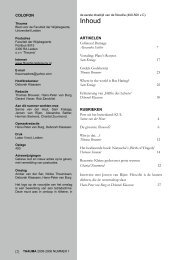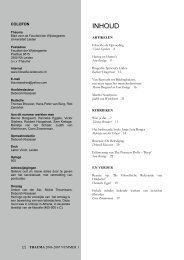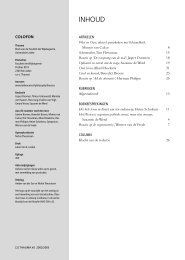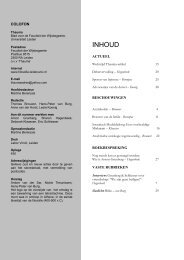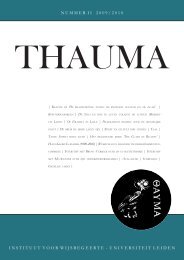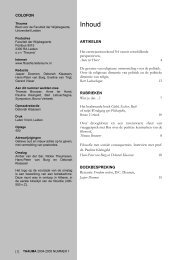Create successful ePaper yourself
Turn your PDF publications into a flip-book with our unique Google optimized e-Paper software.
Van de redactie<br />
<strong>Thauma</strong> vernieuwd<br />
Lectori salutem,<br />
De <strong>Thauma</strong> is vanaf heden geheel<br />
vernieuwd. Niet alleen het schitterende<br />
design is nieuw, met dank aan Miriam<br />
Tijs en Marius Grootveld, ook de opbouw<br />
is anders geworden. De <strong>Thauma</strong> heeft<br />
een hoofdartikel en thema gekregen.<br />
Het hoofdartikel in dit <strong>nummer</strong> is een<br />
interview met filosoof Ray Brassier over<br />
het speculatief realisme. Dank aan Nikola<br />
Andonovski voor zijn prestatie in deze!<br />
We hopen nog veel te kunnen verwachten<br />
van dit talent. Het thema van deze editie<br />
is ‘filosofie op de middelbare school’.<br />
Zo is er een interview met Sijmen<br />
Bastmeijer, docent filosofie aan een<br />
middelbare school, alsmede een artikel<br />
van Channa van Dijk, een middelbare<br />
scholier, over hun favoriete vak ‘filosofie’.<br />
Samen met een verslag van Jordy Hesselink,<br />
deelnemer aan het LAPP-Top programma<br />
van de Universiteit Leiden, ontstaat er een<br />
beeld van filosofie op de middelbare school<br />
- evenals de overgang naar filosofie op de<br />
universiteit.<br />
Voor al diegenen die deze overgang al<br />
hebben gemaakt, heeft Jojanneke Scheepers<br />
een brief geschreven aan de eerstejaars.<br />
Haar brief wordt gevolgd door de afdeling<br />
‘recensies en boekbesprekingen’. Erik<br />
Weynschenk heeft een filosofische recensie<br />
geschreven van de film ‘Det sjunde<br />
inseglet’ van Ingmar Bergman. Daarnaast<br />
heeft Auke Briek een verhandeling over<br />
Heideggers Sein und Zeit ingestuurd. Dit<br />
betekent dat ook de serieuze filosofie - als<br />
vanouds - niet zal worden geschuwd in<br />
de <strong>Thauma</strong>. Een oude <strong>Thauma</strong>-traditie<br />
die ook deze editie weer wordt voortgezet,<br />
is de rubriek “Het beslissende boek”. Deze<br />
rubriek is ditmaal verzorgd door dr. Göran<br />
Sundholm, die - hoe kan het ook anders<br />
- Wittgenstein’s Tractatus behandelt.<br />
Tenslotte valt te lezen wat Klaas de Pater<br />
van Baudrillard vindt, en wat Anne van<br />
Zilfhout’s gedachte is over het nieuwe boek<br />
van Frans de Waal: Een tijd voor empathie.<br />
Het darwinisme vormt in deze <strong>Thauma</strong> een<br />
subthema, want ook de eerste polemische<br />
tekst, van de hand van Norbert Peeters,<br />
betreft het darwinisme. Killing an Arab van<br />
aio Bart Karstens, en de reactie van Rado<br />
Vleugel op Aziz Abdalli's artikel in de vorige<br />
<strong>Thauma</strong>, zijn eveneens polemisch van<br />
aard. Polemos pater pantóon moet men<br />
maar denken. Iets luchtiger van aard<br />
is de berichtgeving uit den verre: Esther<br />
de Paauw vertelt over haar studietijd in<br />
Amerika, en Deborah Klaassen deelt ons<br />
mee wat haar inspireerde tot het schrijven<br />
van haar eerste boek: een roman die zich<br />
afspeelt in Londen. <strong>Thauma</strong> feliciteert<br />
Deborah - oud <strong>Thauma</strong>-hoofdredactrice<br />
- met haar debuut! Het nieuwe verhaal<br />
van Naomi Boekwijt, het schrijftalent<br />
dat de tweede prijs behaalde in de<br />
kerstverhalenwedstrijd van Mare, heet:<br />
Herumspringen. De sublieme waanzin van<br />
Tante Sophia is het laatste artikel in de rij,<br />
en het gedicht Dämmerung van Trakl sluit<br />
deze <strong>Thauma</strong> stemmig af.<br />
De redactie wenst eenieder veel leesplezier!<br />
Interview<br />
“Philosophy is not science’s under-labourer”<br />
An interview with Ray Brassier<br />
Nikola Andonovski<br />
“Speculative realism” is the buzzword<br />
reverberating in Continental philosophy<br />
circles with a vigor unseen since the era<br />
of ‘deconstruction’. Originally coined for a<br />
2007 conference at Goldsmith’s, Speculative<br />
Realism (SR) is less a designation for a<br />
homogeneous philosophical movement<br />
than an umbrella term for a<br />
group of closely related<br />
philosophical projects<br />
sharing a common<br />
enemy. The enemy <strong>–</strong><br />
picturesquely dubbed<br />
‘correlationism’ by<br />
SR pioneer Quentin<br />
Meillassoux <strong>–</strong> is “the<br />
idea according to<br />
which we only ever<br />
have access to the<br />
correlation between<br />
thinking and being,<br />
and never to either<br />
term considered apart<br />
from the other” 1. This (on<br />
SR accounts) standard position<br />
has been the reigning dogma of<br />
20th century Continental philosophy, from<br />
post-Kantian philosophies of representation<br />
to Heideggerian ontologizations of the<br />
human ‘lifeworld’. Taking its cue from the<br />
paralyzing impasses of this standard view,<br />
Speculative Realism defines itself as an<br />
attempt to step out of that “correlationist<br />
deadlock” and question both the Kantian<br />
restrictions of philosophical access and<br />
the phenomenological privileging of<br />
human experience. This imperative has<br />
been a shibboleth of the philosophies of<br />
SR’s front row quartet: of the speculative<br />
overcoming of correlationism in the works<br />
of Meillassoux and Ian Hamilton Grant, of<br />
the resolute nihilism of Ray Brassier, as<br />
well as of the object-oriented ontology of<br />
Graham Harman.<br />
Here we welcome Ray Brassier, the<br />
‘godfather’ of Speculative Realism and the<br />
author of Nihil Unbound: Enlightenment<br />
and Extinction (2007). Brassier,<br />
currently a professor at the<br />
American University in<br />
Beirut, has been a staunch<br />
defender of metaphysical<br />
realism and one of the<br />
most vocal advocates<br />
of the scientific<br />
disenchantment<br />
of the world. In<br />
his debut book, a<br />
fascinating dialogue<br />
with philosophers<br />
as diverse as Sellars,<br />
Churchland and<br />
Gilles Deleuze, he<br />
champions nihilism as<br />
“a necessary consequence<br />
of the coruscating potency of<br />
reason, and hence an invigorating<br />
vector of intellectual discovery” 2.<br />
Brassier’s re-thinking of the relationship<br />
between thought and reality is as much<br />
of a challenge to cognitive “radical<br />
embodiment” theories as it is to<br />
Continental orthodoxy. We asked Ray about<br />
his general views on philosophy, as well as<br />
about some of the specific aspects of his<br />
work.<br />
Ray, the last 150 years can easily be seen<br />
as a process of gradual relinquishing of<br />
philosophical territory. First, ontology to<br />
physics, then (naturalized) epistemology<br />
to psychology, and most recently even<br />
ethics to the proponents of the new neo-



